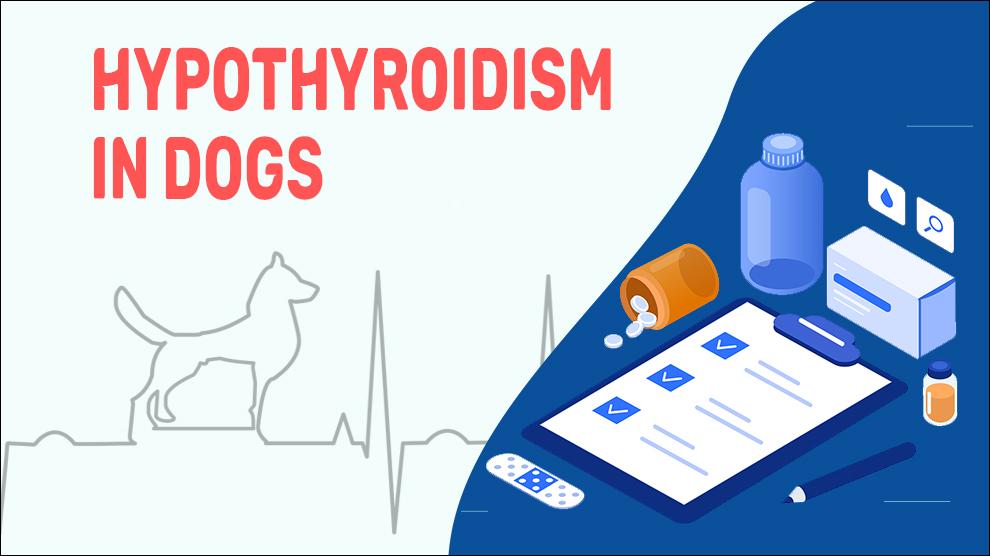What Is Hypothyroidism In Dogs?
Hypothyroidism is a common hormonal disorder that affects dogs. It occurs when the thyroid gland fails to produce enough thyroid hormone, which can lead to a wide range of symptoms and health problems.
The thyroid gland is an essential part of the endocrine system that produces and regulates hormones that control metabolism and energy production.
Hypothyroidism occurs when the thyroid gland does not produce enough thyroid hormone, leading to a decrease in metabolic rate and energy production.
Symptoms Of Hypothyroidism In Dogs
The symptoms of hypothyroidism can vary widely between dogs, and some dogs may show no symptoms at all.
The most common symptoms of hypothyroidism in dogs include:
- Weight gain
- Lethargy
- Hair loss
- Cold intolerance
- Skin infections
- Slow heart rate
- Poor coat quality
- Muscle weakness
- Behavioral changes
Treatment Options For Hypothyroidism In Dogs
The treatment for hypothyroidism in dogs is lifelong hormone replacement therapy. This involves giving the dog synthetic thyroid hormone medication, usually in the form of a daily pill.
Regular blood tests are necessary to monitor the dog's hormone levels and adjust the dosage of medication as needed. The goal of treatment is to restore normal thyroid hormone levels and improve the dog's overall health and well-being.
Home Remedies For Hypothyroidism In Dogs
While there are no specific home remedies for hypothyroidism in dogs, it is important to provide a healthy, balanced diet and plenty of exercises to support their overall health.
Some supplements, such as omega-3 fatty acids, may also help support thyroid function and reduce inflammation. It is important to consult with a veterinarian before giving any supplements or making significant changes to a dog's diet.
How To Prevent Hypothyroidism In Dogs?
There is no known way to prevent hypothyroidism in dogs, as it is largely a genetic disorder. However, regular veterinary checkups and blood tests can help detect the condition early and allow for prompt treatment.
Additionally, feeding a high-quality diet and providing regular exercise can help support a dog's overall health and may reduce the risk of developing hypothyroidism.
Affected Dog Breeds Of Hypothyroidism
Golden Retriever, Labrador Retriever, Doberman Pinscher, Irish Setter, Dachshund, Boxer, Cocker Spaniel
Causes For Hypothyroidism In Dogs
Causes:
The most common cause of hypothyroidism in dogs is an autoimmune disorder known as lymphocytic thyroiditis. This condition occurs when the immune system mistakenly attacks the thyroid gland, leading to inflammation and damage.
Other causes of hypothyroidism in dogs can include:
- Iodine deficiency
- Congenital defects
- Cancer
- Medications
When To See A Vet For Hypothyroidism In Dogs?
If you notice any of the symptoms of hypothyroidism in your dog, it is important to make an appointment with your veterinarian.
They can perform a physical exam and blood tests to determine if your dog has hypothyroidism or another health issue.
Early detection and treatment are important for managing the condition and preventing further health problems.
Food Suggestions For Hypothyroidism In Dogs
Feeding a high-quality, balanced diet is important for dogs with hypothyroidism. Some dogs may benefit from a diet that is low in fat and high in protein to support weight loss and muscle development.
Additionally, feeding a diet that is high in antioxidants, such as fruits and vegetables, may help reduce inflammation and support overall health.
It is important to consult with a veterinarian to determine the best diet for your dog's specific needs.
Conclusion
Hypothyroidism is a common hormonal disorder that can lead to a wide range of symptoms and health problems in dogs.
It is typically caused by an autoimmune disorder known as lymphocytic thyroiditis, but can also have other underlying causes.
The most common symptoms of hypothyroidism in dogs include weight gain, lethargy, and hair loss.
Treatment involves lifelong hormone replacement therapy, and regular veterinary checkups and blood tests can help detect the condition early and allow for prompt treatment.

















